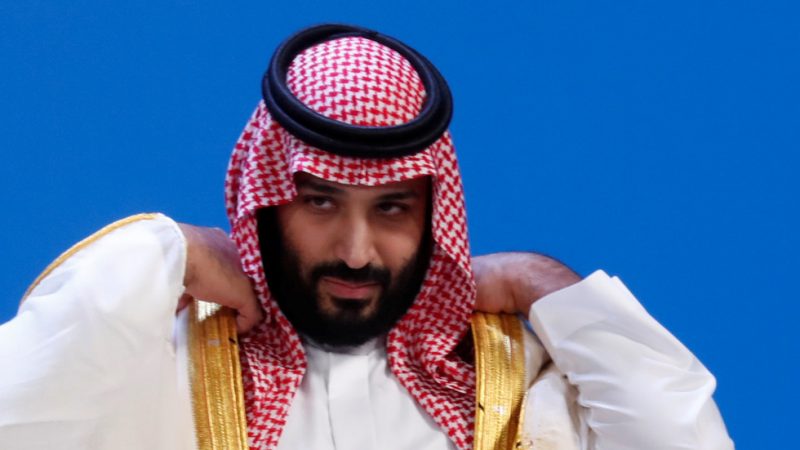
Last week, Human Rights First and others hosted a panel discussion on Capitol Hill aimed at keeping the brutal murder of Washington Post journalist and Virginia resident Jamal Khashoggi in the forefront of Americans’ thoughts as the one-year anniversary of his death approached.
Eleven Members of Congress—five senators and six representatives—made appearances that were more than cameos. They offered serious statements concerning the murder and the perpetrators thereof, the Saudis.
Several even declared Mohammad bin Salman, the young Saudi crown prince whose strategic mistakes are embroiling the Kingdom in possibly its worse morass since its creation, culpable of ordering the murder. The majority of the U.S. Intelligence Community backs them up.
The important question is: how do those of us who care obtain redress?
As the policy-related attachments to the current military spending bill, the National Defense Authorization Act, or NDAA, make their way through the conference process now occurring with regard to that some $740 billion defense authorization, we need to take note that two such attachments concern respectively Khashoggi’s murder and, very much connected, the horrible war in Yemen.
These two attachments, along with several other contentious policy matters, will be the difficult issues in the conferencing process, not the almost three-quarters of a trillion dollars allocated to the military. That part is a done deal.
The Khashoggi policy issue is contained in the provisions of Subtitle K of HR 2500 (the NDAA). These provisions mirror legislation labeled the Saudi Arabia Human Rights and Accountability Act (HR 2037), which was sponsored by Tom Malinowski (D-NJ) and Ann Wagner (R-MO) and passed the House with an overwhelming bipartisan majority, 405 to 7.
Members of both parties have spoken out repeatedly about the need for accountability for the Khashoggi murder. A companion bill (including the same language) was introduced in the Senate with bipartisan support by Senators Chris Coons (D) and Lindsey Graham (R) (S. 2351).
These NDAA provisions take a measured approach to seeking accountability for Khashoggi’s murder. They properly balance accountability for a gruesome murder with the need to maintain a relationship, for now at least, with Saudi Arabia.
The provisions do require a determination of those responsible for the gruesome crime—an approach championed by present and former chairs and ranking members of the Senate Foreign Relations and House Foreign Affairs committees.
The provisions also include visa restrictions on those determined to be responsible, subject to a national interest waiver by the president.
The NDAA provisions also include an “off-ramp”: a statement of precisely what steps the authorities in Riyadh must take in order to terminate the visa restrictions. These steps, such as ceasing the detention and torture of women’s rights activists, enjoy bipartisan support.
The debate over the war in Yemen is more complex. What is now attached to the NDAA (the Khanna-Smith-Schiff-Jayapal amendment) reiterates what was contained in the War Powers Resolution legislation that passed both the House and the Senate but was vetoed by President Trump in April.
Most vital in that legislation—and now in the amendment to the NDAA—is the reassertion by the Congress of its Constitutional responsibility vis a vis the war power.
That reassertion in the specific case of the heinous war in Yemen would demand that the President cease U.S. support for the prosecutors of that war, principally the Saudis and the Emiratis.
In addition to the killing and wounding of tens of thousands of Yemenis by U.S.-supplied bombs, there are several reasons this particular action is past due.
The war has caused a cholera outbreak that is now responsible for the deaths of thousands of Yemenis; rampant starvation that has killed tens of thousands, many of them women and children; and the utter devastation of what was already barely adequate infrastructure in Yemen.
Each of these by itself would necessitate a swift end to this war.
The conflict is now seen by the region’s people as a proxy war, with the Saudis and the Emiratis acting on behalf of the United States in its increasingly dangerous approach to Iran, which has further diminished U.S. credibility and power in this critical region of the world.
Moreover, the Saudi/Emirati alliance is losing the war—thus, the U.S. is losing the war. Too many lost wars can bring down empires. Consider the retinue: Afghanistan, Iraq, Libya, Syria, and now Yemen.
The only certain way to end this conflict and end it swiftly is to forge a political solution. That can be achieved far more readily if the U.S. withdraws its indispensable support for the war and directs Riyadh to settle its grievances at the diplomatic table.
The UAE seems to have already caught a glimpse of this inescapable reality, if its recent actions are any guide.
Thus, to bring the right pressure to bear on the White House, the policy provisions on Yemen attached to the NDAA need to stay where they are and accompany the full bill to passage.
In fact, on both policy issues—Khashoogi’s murder and the Yemen War—the results of the conferencing should be—must be—to leave the legislation much as it is and to let it ride. Let it ride to a vote, a vote that President Trump will find extremely difficult to veto.
That vote just might begin the process of achieving justice and accountability for Khashoggi’s murder and bringing an end to one of the most bitter and destabilizing conflicts in the world.
Lawrence Wilkerson served 31 years in the U.S. Army, retiring as a colonel. He is the Distinguished Visiting Professor of Government and Public Policy at the College of William & Mary.
This article was originally published by Lobe Log
The 21st Century
